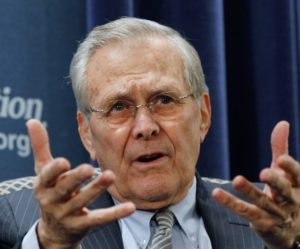 Donald Rumsfeld, “America’s worst secretary of defense,” died Tuesday, June 29, 2021, days shy of his 89th birthday.
Donald Rumsfeld, “America’s worst secretary of defense,” died Tuesday, June 29, 2021, days shy of his 89th birthday.
I remember when he was a rising star in the Republican Party and some people even believed he’d be president someday. He didn’t come close.
But the one-time Illinois congressman did hold a high-level White House job, briefly, as President Ford’s chief of staff, and a variety of other government jobs.
He also was an Eagle Scout, college wrestler, Navy flier, and corporate CEO; he had the resume that spells “hyper-ambitious,” which is why everyone assumed he was angling for the top job.
Writing in The Atlantic, journalist George Packer argues (here) that Rumsfield’s public service legacy isn’t all that complicated. Simply put, he screwed up everything he touched, and never looked back:
“Rumsfeld was the chief advocate of every disaster in the years after September 11. Wherever the United States government contemplated a wrong turn, Rumsfeld was there … shoving his country deeper into a hole. His fatal judgment was equaled only by his absolute self-assurance. … Rumsfeld started being wrong within hours of the attacks and never stopped.”
Here are some of the things Packer says Rumsfeld was wrong about:
- He thought that the American war in Afghanistan meant the end of the Taliban.
- He thought that the new Afghan government didn’t need the U.S. to stick around for security and support.
- He thought that the United States should stiff the United Nations, brush off allies, and go it alone.
This is a truncated list; the actual indictment is longer. Perhaps most damning: “He reserved his greatest confidence for intelligence obtained through torture.”
No, wait, this is even more damning: “By the time Rumsfeld was fired, in November 2006, the U.S., instead of securing peace in one country, was losing wars in two, largely because of actions and decisions taken by Rumsfeld himself.” Not mentioned, perhaps mercifully, is the thousands of U.S. soldiers’ lives sacrificed by the screwups that flowed from his wrong assessments and bad judgment.
Unquestionably bright, he was hampered by hubris; he thought too highly of himself for his own good. As Packer writes, “He lacked the courage to doubt himself. He lacked the wisdom to change his mind.” In other words, he had Trump’s self-assurance, closed-mindedness, lack of morals, and propensity for being wrong. In a way, he was the original Trump, but without the latter’s gift for demagoguery or pathological lying.
But while historians mull over and argue about his personal shortcomings and copious mistakes, most people will only remember his most famous quote:
” … there are known knowns … [the] things we know we know. We also know there are known unknowns … we know there are some things we do not know. But there are also unknown unknowns — the ones we don’t know we don’t know.“
Yes, it was Rumsfeld who came up with that gem. Mark Twain had it down better:
“It ain’t what you don’t know that gets you into trouble. It’s what you know for sure that just ain’t so.”
Rumsfeld could’ve used some of that advice.
Related article: An Iraqi doctor and journalist recounts Rumsfeld’s warmongering based on lies, and laments that he was never brought “to face justice” for “the destruction he caused and the lives he ruined.” Read his opinion here.